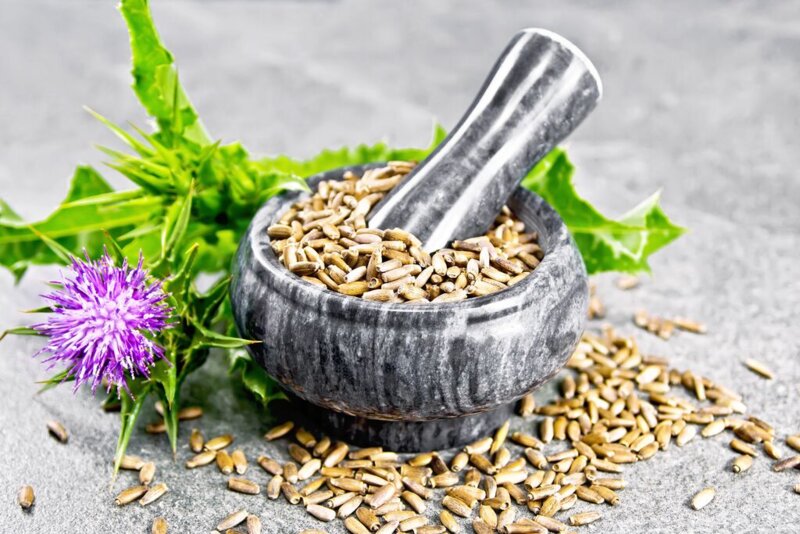Vital substances are the micronutrients already mentioned (vitamins and minerals).
On the trail of nutrient predators – where they hide and how we outwit them

In our hectic everyday lives, it is sometimes a challenge to provide our bodies with all the vital nutrients they need. An unbalanced diet, alcohol, smoking, medication and stress can cause a nutrient deficiency. Find out in this article what nutrient robbers are, where they hide and how we can outsmart them.
What are nutrients?
Nutrition plays a crucial role in our health and well-being. It provides our body with vital nutrients that are essential for the smooth running of many bodily functions. Nutrients can be categorised into macronutrients and micronutrients. Macronutrients primarily provide the body with energy. These include proteins, carbohydrates and fats. Micronutrients do not provide energy, but are essential for maintaining vital functions. They are so-called essential nutrients. This means that the body cannot produce them itself and must take them in with food. Micronutrients include vitamins such as folic acid, vitamin C or vitamin D and minerals such as calcium, zinc or iron (1).
What are vital substances?
But also other substances that have positive effects on health, such as secondary plant substances (2).
Food as a nutrient robber
Some foods and food ingredients can hinder the absorption of nutrients from the intestine. Because the body lacks these nutrients, they are called nutrient robbers. Typical nutrient robbers in our diet include coffee, black tea, oxalic acid and phytic acid.
Coffee and black tea
Coffee and black tea contain tannins. If these are consumed with food, they can hinder the absorption of zinc (3, 4) and calcium and iron from plant foods and thus lead to a deficiency (5, 6). Iron is an essential component of the red blood pigment and plays an important role in our body's oxygen transport. While calcium is particularly important for bones and teeth (7), we need zinc for a well-functioning immune system (8).
The caffeine contained in coffee and black tea also contributes to more calcium (9, 10) and magnesium being excreted in the urine (11). Magnesium supports muscle function and the nervous system and is involved in energy production in the body (11).
Sugar and sweets
For a long time, it was believed that sugar was a nutrient robber because the body needs vitamin B1 to break it down. However, scientific studies have shown that the vitamin is not used up in the process, but can be utilised by the body again and again (12). However, a high consumption of sugary foods can indirectly favour a nutrient deficiency. As sugar and sugary foods usually contain a lot of calories but almost no nutrients, they provide the body with almost nothing but so-called "empty calories". If you eat large quantities of nutrient-poor, sugary foods, you simply no longer have an appetite for more nutrient-rich foods. The result is an unbalanced diet with a lower intake of important micronutrients.
Food ingredients
A nutrient robber that many people have probably never heard of is mainly found in spinach, rhubarb, chard, beetroot, nuts, cocoa and black tea. We are talking about oxalic acid. Oxalic acid forms insoluble compounds in the intestine with calcium, magnesium and iron from food. This makes it difficult for the body to absorb these nutrients. This can lead to a mineral deficiency in unbalanced diets, vegans and other people who do not consume calcium-rich milk and dairy products. With a balanced diet, however, the occasional consumption of foods containing oxalic acid is harmless. The oxalic acid content can also be reduced by cooking (13).
Phytic acid is another plant constituent that can impair nutrient absorption. Phytic acid is mainly found in wholemeal cereals, pulses and nuts. It serves the plants as a store for phosphate, which the seedling needs for growth. However, phytic acid forms insoluble compounds with magnesium, calcium, zinc and iron and therefore hinders absorption into the body. However, the phytic acid content can be reduced by soaking, sprouting and fermenting (14).
Nutrient robbers alcohol, smoking and stress
An unhealthy lifestyle with regular alcohol consumption, smoking and stress is also considered a nutrient robber and can cause a nutrient deficiency.
Alcohol
Excessive consumption of alcohol has a negative effect on the supply of vital substances. Alcohol impairs the absorption and storage of folic acid and vitamins B1, B2 and B6 (15). The conversion of vitamins, especially the B vitamins and vitamins A, D and E into their metabolically active form, is also impaired by alcohol (16). The body also lacks vitamin C and selenium because alcohol reduces their absorption from the intestine (15). The excretion of magnesium and zinc via the kidneys is also increased by alcohol (15; 11). This results in reduced absorption and increased excretion of important vital substances. At the same time, the need for certain micronutrients is increased, which favours a nutrient deficiency.
Smoking
Smoking not only impairs health, but also the supply of nutrients. Smoking causes harmful free radicals to enter the body. To protect itself from these, the body needs more antioxidants such as vitamin C, which can protect the cells from damage caused by free radicals. For this reason, smokers need up to 40% more vitamin C than non-smokers (17). Smoking also reduces the amounts of calcium (18) and vitamin D (19) available in the body: important vital substances for our bone metabolism.
Stress
Stress, whether in everyday life or at work, is omnipresent in today's hectic world. However, long-term stress in the form of prolonged physical, mental or emotional overload can have a negative impact on the supply of micronutrients. Studies show that stress reduces the concentration of magnesium, zinc, calcium, iron and niacin in the body, which can lead to a nutrient deficiency (20).
Medication as a nutrient robber
Certain medications can also interfere with nutrient absorption and lead to a nutrient deficiency, especially if taken over a longer period of time. These medications include antibiotics, the contraceptive pill, antihypertensives, cholesterol-lowering drugs, diabetes medication, diuretics and gastric acid blockers. Some of these drugs inhibit the absorption of micronutrients from the intestine. Others lead to increased excretion via the urine or interfere with the metabolism of nutrients. Depending on the medication, vitamin B6, B12, folic acid, vitamin C, vitamin D, vitamin E, iron, calcium, magnesium and zinc are affected (21).
How can an optimal supply of nutrients be ensured despite nutrient robbers?
First and foremost, the need for nutrients should be covered by a balanced diet. If this is not possible, for example in certain life situations, and nutrient robbers such as stress, medication or smoking also contribute to an inadequate supply of nutrients, food supplements make a valuable contribution to an optimal supply of vital substances.
How can you outwit nutrient robbers?
- Do not drink coffee or black tea immediately after eating, but at the earliest 30 minutes or better still 2 hours after eating. This allows zinc, calcium and iron from plant-based foods to be optimally absorbed from the intestine despite the tannins they contain.
- Drink a glass of orange juice with your morning muesli instead of coffee or black tea. This way, the absorption of iron is not impaired by tannins, but actually improved by the vitamin C in the juice.
- Instead of high-sugar snacks, it's better to reach for a healthy, nutritious apple or vegetable sticks.
- Cook foods containing oxalic acid, such as spinach, chard and beetroot, before eating them, so that some of the oxalic acid is transferred to the cooking water (pour away the cooking water).
- Pay attention to a healthy lifestyle: Reducing stress, moderate alcohol consumption and refraining from smoking contribute to a better supply of vital substances.
- In certain life situations where a balanced diet is not enough, you can consider taking dietary supplements.
Sources
(1) Biesalski HK. Mikronährstoffe als Motor der Evolution. Berlin: Springer Spektrum; 2015. S. 5.
(2) Rehberg C. Vitalstoffe: so können Sie einen Mangel ausgleichen. https://www.zentrum-der-gesundheit.de/ernaehrung/ernaehrungsformen/gesunde-ernaehrung/vitalstoffe (abgerufen am 20.01.2024).
(3) Knez M, Stangoulis JCR. Dietary Zn deficiency, the current situation and potential solutions. Nutrition Research Reviews. 2023;36(2):199-215. https://pubmed.ncbi.nlm.nih.gov/37062532/.
(4) Zhou T. Methods to supplement the mineral-containing proteins. Chapter 7. In: Mineral Containing Proteins. Roles in Nutrition. Springer Nature Singapore, 2017.
(5) Bundesinstitut für Risikobewertung (BfR). Fragen und Antworten zu Eisen in Lebensmitteln. Welche Faktoren hemmen oder fördern die Eisenaufnahme? https://www.bfr.bund.de/cd/28370 (abgerufen am 8.02.2024).
(6) Schwarcz J. Is coffee having an effect on my iron absorption? McGill Office for Science and Society. Last updated 10.5.2019. https://www.mcgill.ca/oss/article/can-coffee-inhibit-absorption-iron (abgerufen am 25.01.2024).
(7) Deutsche Gesellschaft für Ernährung (DGE). Ausgewählte Fragen und Antworten zu Calcium. Stand 2013. https://www.dge.de/gesunde-ernaehrung/faq/calcium/ (Zugriff am 8.02.2024).
(8) Classen HG, Birkelbach, D. Reich A. Wie wirkt der Biofaktor Zink auf das Immunsystem? Zeitschrift für Komplementärmedizin 2023;15(03):34-38. https://www.thieme-connect.com/products/ejournals/abstract/10.1055/a-2057-2638
(9) Reuter SE, Schultz HB, Ward MB, et al. The effect of high-dose, short-term caffeine intake on the renal clearance of calcium, sodium and creatinine in healthy adults. Br J Clin Pharmacol. 2021;87(11):4461-4466. https://pubmed.ncbi.nlm.nih.gov/33852164/.
(10) Domke A, Grossklaus B, Niemann H, et al. (Hg.). Bundesinstitut für Riskiobewertung (BfR). Verwendung von Mineralstoffen in Lebensmitteln. Toxikologische und ernährungsphysiologische Aspekte. Berlin, 2004.
(11) Deutsche Gesellschaft für Ernährung (DGE). Ausgewählte Fragen und Antworten zu Magnesium. Stand 2022. https://www.dge.de/gesunde-ernaehrung/faq/ausgewaehlte-fragen-und-antworten-zu-magnesium/#c3594 (Zugriff am 30.01.2024).
(12) Zucker- ein Vitaminräuber? https://www.spektrum.de/news/zucker-ein-vitaminraeuber/340841 (abgerufen am 8.02.2024).
(13) Weiss C. Oxalsäure. Ernährungsumschau 2009;11:636-639.
(14) Piskin E, Tinsley G. Phytic Acid 101: Everything you need to know. Healthline. [Internet.] Updated Nov. 2023 (abgerufen am 29.01.2024).
(15) Bode Ch, Bode J. Protektive Wirkungen und Mißbrauch von Alkohol. In: Biesalski KH, et al (Hg.): Ernährungsmedizin. Nach dem Curriculum Ernährungsmedizin der Bundesärztekammer. 3. Aufl. 2004. Stuttgart: Thieme, S. 516 – 538.
(16) Kasper H: Ernährungsmedizin und Diätetik. Kapitel 1.9, 70-74, Urban & Fischer Verlag; München/Jena 2000
(17) Deutsche Gesellschaft für Ernährung (DGE). Referenzwerte für die Nährstoffzufuhr. https://www.dge.de/wissenschaft/referenzwerte/vitamin-c/ (abgerufen am 8.02.2024).
(18) Krall EA, Dawson-Hughes B. Smoking increases bone loss and decreases intestinal calcium absorption. J Bone Miner Res. 1999 Feb;14(2):215-20. https://pubmed.ncbi.nlm.nih.gov/9933475/.
(19) Brot, C, Jorgensen, NR, Sorensen, OH. The influence of smoking on vitamin D status and calcium metabolism. Eur J Clin Nutr 1999;53:920–6. https://pubmed.ncbi.nlm.nih.gov/10602348/.
(20) Lopresti AL. The Effects of Psychological and Environmental Stress on Micronutrient Concentrations in the Body: A Review of the Evidence. Adv Nutr. 2020 Jan 1;11(1):103-112. https://pubmed.ncbi.nlm.nih.gov/31504084/.
(21) Mohn ES, Kern HJ, Saltzman E, Mitmesser SH, McKay DL. Evidence of Drug-Nutrient Interactions with Chronic Use of Commonly Prescribed Medications: An Update. Pharmaceutics. 2018;10(1):36. https://pubmed.ncbi.nlm.nih.gov/29558445/.









